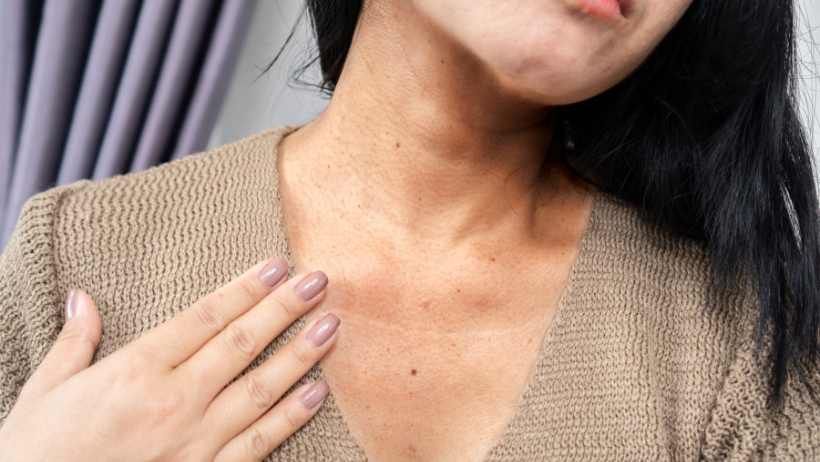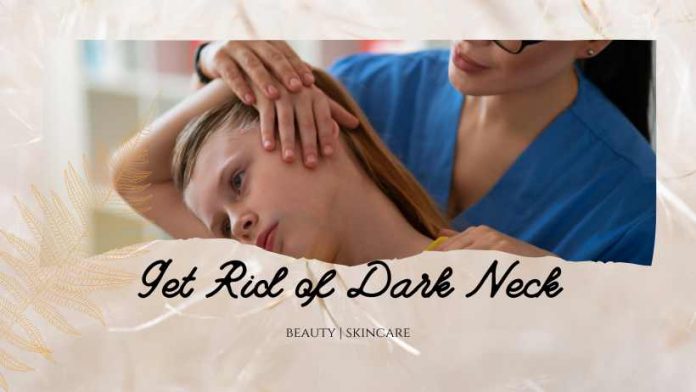Whether it is due to hormones, sun exposure, or other skin-related conditions, the skin in and around our neck is always prone to darkening. And quite often, such people notice changes to the texture of their skin, like feeling softer or thickening of the skin in the neck and surrounding areas.
Darkening of the skin around the neck can also be due to a hereditary disorder called Acanthosis Nigricans. It is a genetic syndrome passed on to the child from the parents. This condition is characterized chiefly by dark, velvety hyperpigmentation in body folds and creases of the skin in the armpits, groin, and neck areas.
However, a dark neck is not a harmful or contagious condition. But it might be a sign of yet another more serious condition. So, it is advised that you should see a doctor at the first signs of darkening of the skin in the neck and adjoining areas.
Dark Neck is a Matter of Concern
It is a matter of concern to find that your neck is turning dark while the skin on your face is not. Struggling to understand what is the cause behind this discoloration is disheartening.
However, many factors eventually cause this condition. Know that your skin is susceptible, to begin with. And then any change in the weather, diet, or skincare routine can affect the skin. Especially the skin around the neck reacts accordingly.
Pigmentation or dark patches around the neck is not just a result of poor hygiene. And quite often, it cannot be cured with home remedies. It would help if you went to the root cause of this happening to eliminate this standing. And for which you will need the services of a dermatologist who can evaluate and best explain how to get rid of a dark neck and associated conditions.
List of 10 Causes of Dark Neck

Here are some potential causes of why people have dark necks.
1. Acanthosis Nigricans
Usually passed on to a child by the parents, this condition is a part of the genetic syndrome and is often associated with hyperthyroidism. It is characterized by dark, velvety skin hyperpigmentation in and around the neck.
2. Dermatitis Neglecta
This skin condition occurs when you have a buildup of dead skin cells due to oil, sweat, and bacteria. It can cause discoloration and skin plaques. And the neck is the most common place for this to develop. Ensure to clean and exfoliate your neck regularly to maintain proper hygiene.
3. Dyskeratosis congenita
This condition is also known as Zinsser-Engman-Cole syndrome. It causes the neck to look dirty due to hyperpigmentation. In addition to dark patches, it can also cause sparse eyelashes, ridging of the fingernails, and white patches inside the mouth.
4. Erythema Dyschromicum Perstans
Also known as Ashy Dermatosis, this condition causes dark bluish, gray, or black patches of skin on the neck and upper arms. These patches also appear on the torso sometimes.
5. Polycystic Ovary Syndrome (PCOS)
You can experience hyperpigmentation on the neck and at the back of the neck with too much insulin in the blood. It is commonly associated with women having PCOS.
6. Lichen Planus Pigmentosus (LPP)
It is a chronic pigmentation disorder. And shows extended or interlaced dark brown macules on the skin areas exposed to the sun. LPP is an inflammatory condition that causes scarring to develop in areas of the neck. Symptoms of LPP usually include grey, brown, or black patches on the face and neck areas.
7. Tinea Versicolor
This is a Mallassezia Furfur fungus infection. It is a type of yeast that is naturally present on the skin. And too much of it or overgrowth can cause dark patches on the neck.
8. Sun Exposure
One of the most common causes of skin darkening is excessive sun exposure. If your neck is exposed to the sun for longer durations than your face, it could lead to tanning or hyperpigmentation.
9. Clothing
The clothing you wear can also contribute to skin darkening. It is more for people who wear shirts or tops with low necklines. The neck may be exposed to the sun more, causing it to darken.
10. Friction and rubbing
Tight collars, scarves, or necklaces can also lead to neck darkening. The irritation caused by friction can cause post-inflammatory hyperpigmentation, resulting in darker skin.
Endocrine disorders, including obesity, are other common causes of skin darkening. People who are obese and with diabetes are at a greater risk of developing a darker neck.
Effective Treatments for Dark Neck
Once the cause of your black neck is determined, doctors will recommend condition-specific solutions. Here are some available treatment options.
- Doctors usually treat fungal infections with antifungal ointments in cases of Tinea Versicolor. These can be applied to the skin. However, severe cases of this condition may require oral antifungal medications as well.
- Scrubbing with soap and water often reduces the appearance of a black neck from Dermatitis Neglecta. Therapists often soak the neck of the patient in a bath or apply a hot compress to loosen stubborn debris in the area.
- There are skin-lightening scrubs and creams that reduce skin darkening associated with Acanthosis Nigricans, But these are not always adequate. Addressing the underlying causes usually help. These include managing blood sugar levels and losing weight.
- Treatment options for hyperpigmentation generally include topical tretinoin. It is a formation of retinoic acid that encourages skin cell transformation. Laser therapies are also employed and help reduce the extent of hyperpigmentation.
Then there are quite a few other treatment options as well. But they will depend upon the person’s underlying condition and overall health.
Prevention and Home Care Practices
Lifestyle habits and specific skincare also help reduce the occurrence of a black neck. Such preventative measures include:
- Washing the neck skin with soap and water twice daily.
- Using exfoliating scrubs. These help you get rid of dead skin cells.
- Regular application of sunscreen.
- Consuming a healthy diet consisting of various fruits and vegetables.
Many skincare products also help in lightening the skin. However, there is no conclusive scientific evidence to support the effectiveness of the ingredients mentioned below:
- Arbutin
- Azelaic Acid
- Kojic Acid
- Licorice
- Mulberry
- Turmeric
- Vitamin C
Nevertheless, applying such products at home may provide some positive results. However, you should always use a new product to a small area or test a patch first. And then, wait for 24 hours to ensure that these substances are not allergic or sensitive to your skin type.
When to Seek Medical Advice – Kolors Healthcare
Although a hyperpigmented or black neck can be troublesome, it is most often treatable. But then it is advised that you consult a skin specialist at Kolors for a proper diagnosis if you are unsure of the cause of black neck. Immediately consult Kolors if you are experiencing symptoms like itching and pain alongside discoloration.









